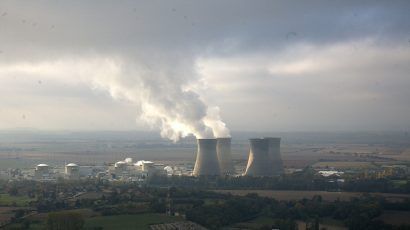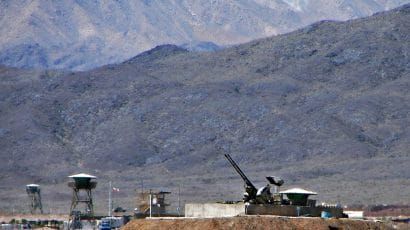Search results for nuclear terrorism
A security system commensurate with the risk of nuclear terrorism
A hot mic shouldn't overshadow a dirty bomb. The Nuclear Security Summit in Seoul ended recently with two dominant story lines: President Obama's "hot mic" comments to Russian President Medvedev and the 53 participating governments congratulating themselves on the summit's outcomes. Both miss the key strategic problem that the Seoul Summit did not address: the need to unify the current patchwork, largely voluntary approach to nuclear security that is not commensurate with the risk or consequences of nuclear terrorism.
New online course from The William J. Perry Project: The Threat of Nuclear Terrorism
Announcing a new free online course from The William J. Perry Project: The Threat of Nuclear Terrorism. In this custom-designed MOOC, former Secretary of Defense William Perry brings together internationally-renowned experts, scientists, political activists and scholars to address the critical, and often poorly understood, dangers of nuclear terrorism. This new course launches October 17th—you … Continued
Whither the anti-terrorism budget?
Nuclear terrorism is the ultimate preventable catastrophe. If highly enriched uranium and plutonium are adequately secured or eliminated, they cannot be stolen for use in a nuclear device. In 2011, Director of National Intelligence James Clapper noted that "poorly secured stocks of [chemical, biological, radiological, and nuclear materials] provide potential source material for terror attacks." Osama bin Laden may be dead, but the threat of nuclear terrorism remains.
The oversight imperative
The prevention of nuclear terrorism, one of the foremost international security threats that we face today, relies on separate national regulations with little oversight. There are few international checks and balances on the physical protection of the treacherous material, which could be used to create nuclear devices by terrorists, aside from bilateral agreements and individual treaties formed at the will of individual states. This lack of binding guidelines and international oversight of nuclear security is inadequate for today's nuclear risks.
Why Latin America matters at the Nuclear Security Summit
It is a fact that nuclear terrorism is a global threat and has become a worldwide concern. But what is particularly frightening is that there is no clearly defined plan for securing all nuclear materials. According to the Nuclear Threat Initiative's (NTI) Nuclear Material Security Index, there is no global consensus about what steps matter most in achieving nuclear security.
Right-Sizing the “Loose Nukes” Security Budget: Part 1
Highlighting the danger posed by nuclear terrorism and the need for an effective response, President Barack Obama came to office promising to "secure all vulnerable nuclear materials around the world within four years." The necessity of this goal is unquestioned. In fact, since 2004, at least four published official government reports have criticized the adequacy of the U.S. government's response to the threat of nuclear terrorism. The ability to achieve this objective, however, has been questioned.
How to safeguard loose nukes
Four years ago, President Barack Obama called preventing nuclear terrorism a top security priority. But even though he said in his State of the Union speech last week that Washington "would continue leading the global effort to secure nuclear materials that could fall into the wrong hands," the United States is only marginally safer from that threat today than it was at the beginning of his first term.
Voluntary regimes can advance nuclear security
Bottom-up, business-led improvements will help keep the world safe from nuclear terrorism.
A threat that demands action
For years, American politicians on both sides of the aisle have agreed that nuclear terrorism is one of the most serious national security threats the United States faces. In 2013, President Obama must capitalize on this rare consensus point and on his own power as a second-term president. After all, despite ongoing polarization in Washington, bipartisan cooperation has been the norm for nuclear security since the launch of the Nunn-Lugar program more than two decades ago, making the issue a unique outlier in Washington -- and for good reason.
Regime change for nuclear security
Almost no country in the world would refuse an invitation to join a collective declaration acknowledging nuclear terrorism as one of the most challenging threats to global security. However, defining a common view about how to advance practical measures that will prevent nuclear terrorism is not so easy. When it comes to nuclear security, it has always been difficult to go from statements to actions.
Confronting twenty-first-century nuclear security realities
In the past six months, President Barack Obama has taken three major steps to protect the world from nuclear terrorism and advance the disarmament agenda. First, during his April speech in Prague, he outlined his arms control and nonproliferation objectives and announced a U.S.-led international effort to secure all of the world's vulnerable nuclear materials within four years.
US-Russian space cooperation: a model for nuclear security
Steps Washington and Moscow took to transform their space rivalry into cooperation can serve as a model for working together to help prevent nuclear terrorism.
Alleged sabotage at Iran’s Natanz nuclear facility comes amid talks on reviving the Iran nuclear deal
Iran’s Natanz underground uranium enrichment site—a key nuclear facility for the country—went dark on Sunday in what Iranian officials called an act of “nuclear terrorism” carried out by Israel, bringing a shadow conflict between Iran and Israel into sharper focus and threatening to derail renewed efforts by Iran and the United States to revive talks on the Iran nuclear deal.
Toward a better Nuclear Security Summit
The Nuclear Security Summit taking place in Seoul next month is expected to reinforce the commitment of the international community to confronting the threat of nuclear terrorism. The summit process provides a unique opportunity to ensure that nuclear security receives the high-level attention it deserves from governments around the world. It also entrusts the participants with a special responsibility not to let this opportunity pass by.
Nuclear materials security: Cooperation is key
As South Korea prepares for the second Nuclear Security Summit, scheduled to take place in Seoul next March, the momentum for collective international action on nuclear terrorism must be sustained. In the months before the 2012 talks, states will have to work together to retain focus on the summit's ultimate goal -- securing vulnerable nuclear material worldwide -- or else risk taking a step backward in the fight against the menace of nuclear terrorism.
Two treaties. One Congress. No time to wait.
While Washington, DC, is paralyzed by partisanship on most topics, there is one issue that commands overwhelming bipartisan agreement: the threat posed to US national security by nuclear terrorism.
Seoul purpose
In April 2010, representatives from 47 countries and three international organizations gathered in Washington, DC, for the first Nuclear Security Summit, an international effort created to strengthen fissile material security measures and prevent nuclear terrorism. Leaders endorsed the summit's objective of securing all vulnerable nuclear materials around the world in four years and signed consensus communiqué and work plan documents focused on compliance with today's nuclear material security regime.
The Nuclear Posture Review, now and later
The long-awaited report of the third Nuclear Posture Review is now scheduled for delivery to Congress on March 1. According to a recent New York Times article, the posture review will consider the prevention of nuclear proliferation and nuclear terrorism to be equally as important as the nuclear deterrence mission.
Chinese nuclear security practices
The 2010 Nuclear Security Summit in Washington, DC, was a milestone for nuclear security. Political leaders from 47 countries, including the United States, and multilateral organizations gathered to make a concerted global effort to protect vulnerable nuclear material and to prevent nuclear terrorism. Chinese President Hu Jintao -- putting aside China-US disputes over arms sales to Taiwan and the Dalai Lama's visit to Washington -- attended the summit, speaking positively of China's responsible and cooperative attitude toward international security.



